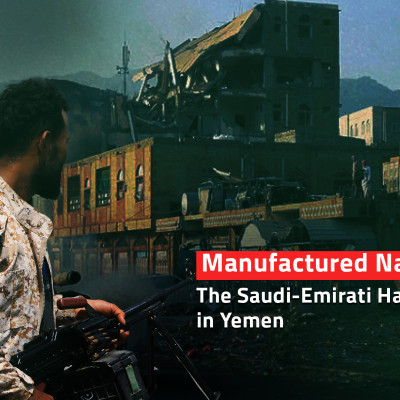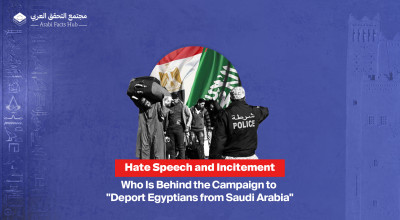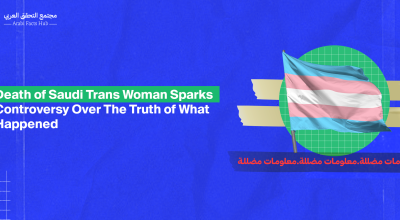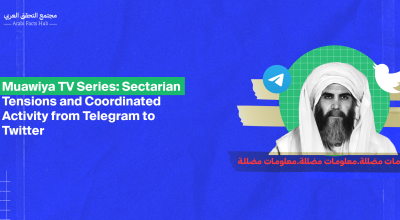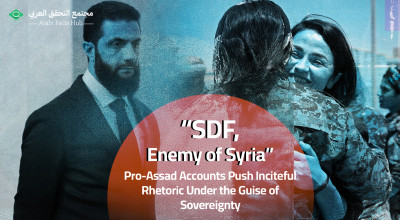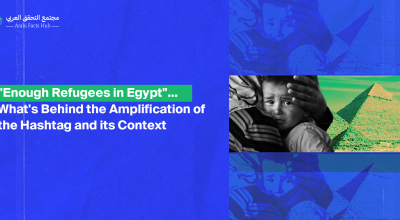The Shawarma Battle and “Guests”: A New Campaign Against Refugees in Egypt
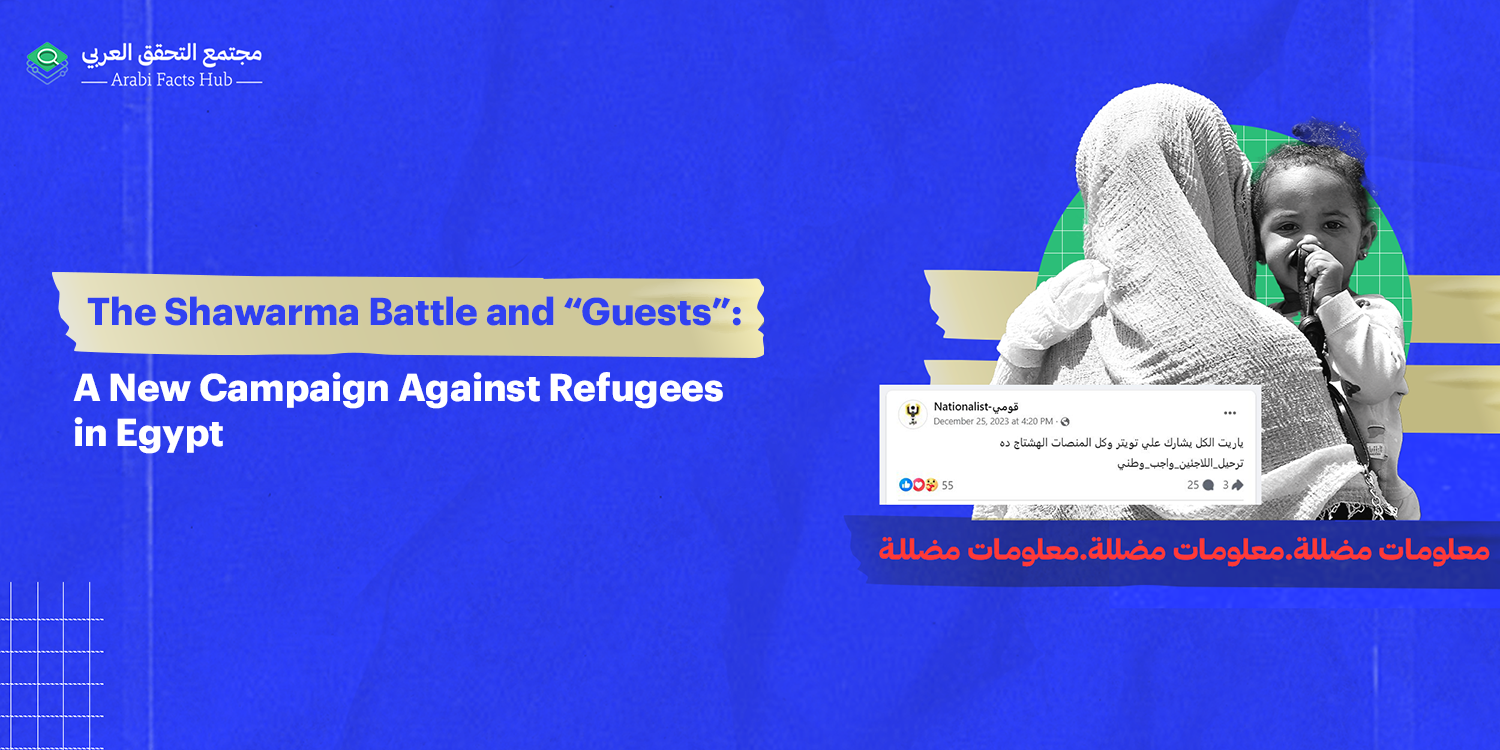
Following the developments of the Israeli war on Gaza, hashtags attacking refugees reappeared in Egypt, alongside statements from Egyptian officials opposing attempts to relocate Palestinians to Egypt, to prevent the "liquidation of the Palestinian issue." The campaign extended to calling for a boycott of refugee businesses, especially Syrian shawarma restaurants, amid a wave of enthusiasm for Egyptian shawarma.
New calls for deporting refugees from Egypt emerged, accompanied by coordinated activity urging them to leave the country, citing the worsening economic crisis and the decline in the standard of living for Egyptians. This is compounded by the developments in the war in Gaza and the transformation of the Sinai Desert into part of the Israeli "transfer" discourse, as a suitable area for the relocation of the displaced residents of Gaza. President Sisi unequivocally rejected this matter, reinforcing the anti-refugee blogging campaign through various coordinated hashtags. The official statements about "guests" have escalated, and the announcement of collecting dollar fees from foreigners residing in Egypt.
In the Arabi Facts Hub, we monitored similar campaigns over the past years, some calling for the expulsion of Syrian refugees and refusing the entry of more Sudanese fleeing the war. There was also objection to naturalizing refugees after a decision that might allow foreigners to obtain Egyptian citizenship. Currently, we have observed a recurrence of this anti-refugee discourse under hashtags such as #Deporting_refugees_is_a_national_obligation, #Deporting_refugees_is_a_national_demand, #Deporting_refugees_is_a_popular_demand, #Naturalizing_refugees_in_a_catastrophe, #Shutdown_UNHCR_in_Egypt, #Shutdown_UNHCR_expel_refugees, #Against_naturalizing_refugees, #Boycott_Syrian_Shops, #I_Will_only_buy_Egyptian, #Enough_refugees_were_fed_up
From October 1, 2023, to January 7, 2024, the mentioned hashtags were referenced over 238,000 times on X (formerly Twitter), with an average of over 2,500 posts per day. The posts were seen over 37 million times, with a potential reach of 26.6 million more, according to the leading content analysis and social network monitoring company Meltwater.
Despite the activity of these anti-refugee campaigns over the years, these statistics indicate a record level of activity on this issue. The hashtags experienced several peak times, mostly in December and January.
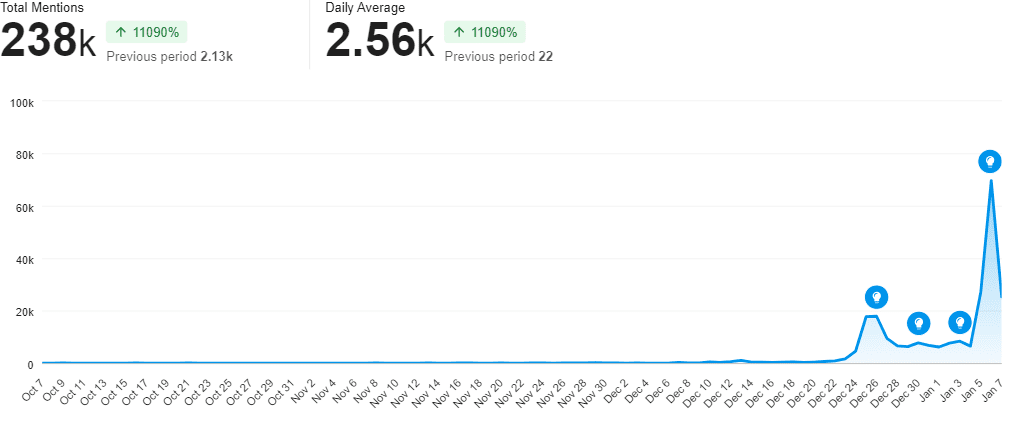
Number of posts on the hashtags hostile to refugees between October 1 2023 and January 6 2024 – Meltwater
The most influential hashtags
More than 45,600 accounts participated in the blogging wave, including accounts aligned with nationalist groups and others promoting ancient Egyptian civilization, featuring pharaonic symbols. Additionally, there were supporters of President Sisi. The most active accounts on the hashtags had tens of thousands of followers, and some were verified with paid verification badges.
The hashtag #Deporting_refugees_is_a_popular_demand regained momentum with the recent anti-refugee wave. On June 29, 2019, the hashtag was first launched by the account @Nefertery_Ahmos, who identifies as "Nefertery - Daughter of the Great Ancestors." At that time, it was in response to an account that had been suspended by the X platform (formerly Twitter).
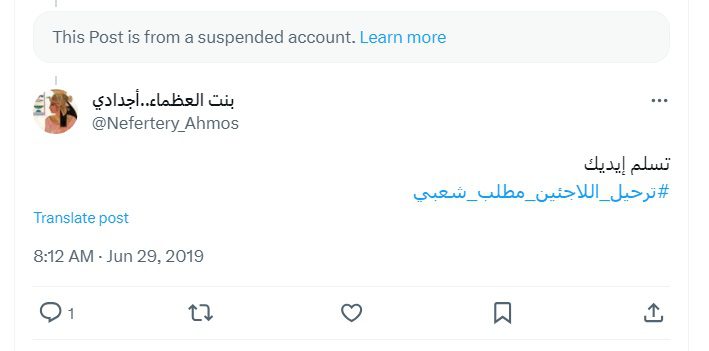
The account, followed by more than 31,000 users, has been active for over a decade, expressing pride in Egyptian civilization over other components and historical eras that the country has experienced. The account shares a similar tone with many pages and accounts that amplify the same discourse, some of which identify themselves as "Children of Kemet" and are occasionally referred to as "Al-Kemaita," derived from the pharaonic name for Egypt.
The account is owned by a girl named Iftikar El-Sayed El-Bendary. She was born in a village in Sohag in Upper Egypt, as she introduced herself in one of the videos on her YouTube channel.
Iftikar, or Nefertery, has been blogging since 2011, under the name "Kemet and the Hyksos." She published an e-book, of which she printed only 10 physical copies in August 2019. She still complains about her inability to find a publisher. The book is titled "The Tragedy of the Hyksos Resettlement (The Egyptian Catastrophe)."
The term Hyksos refers to various pastoral peoples in Western Asia who, at some point, controlled the eastern part of ancient Egypt. The name is drawn from the literary narratives of the "Kemaita" campaigns against foreigners and refugees in Egypt, due to its recognizable impact when used.
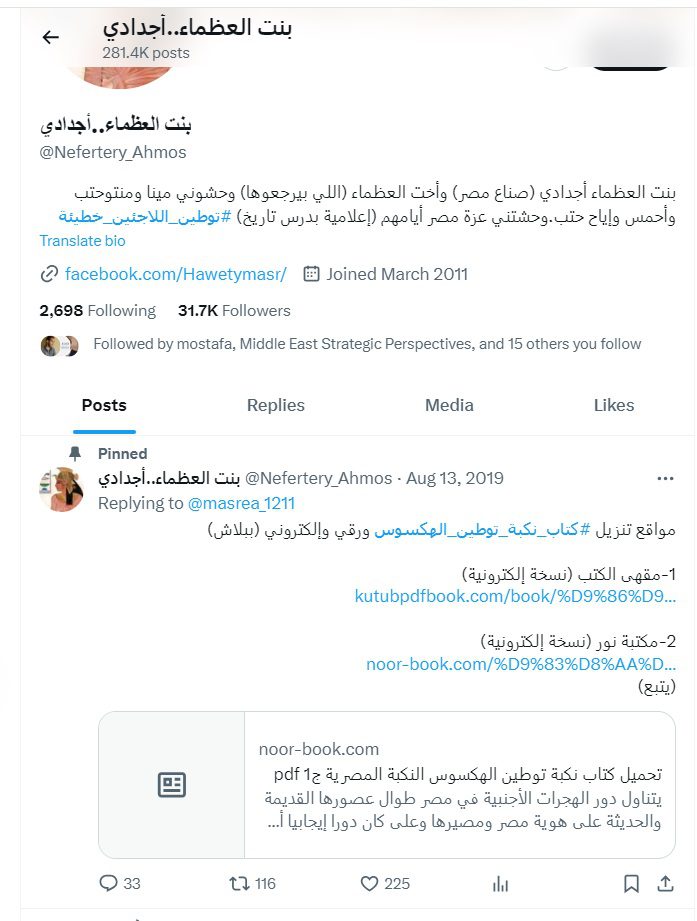
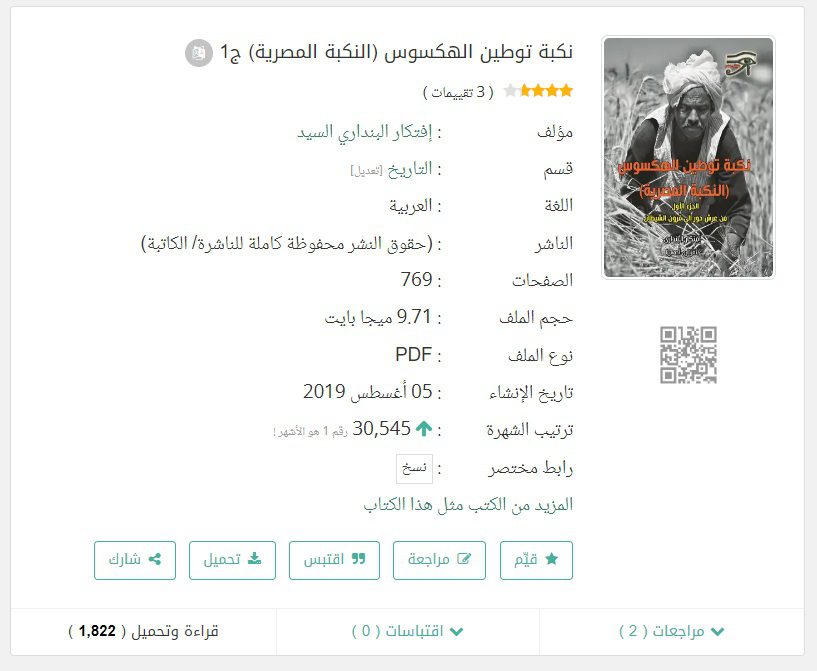
Writer and researcher Sherin Helal was one of the prominent figures active on hashtags opposing refugees, including #Deporting_refugees_is_a_national_demand, #Deporting_refugees_is_a_popular_demand and #Boycott_Syrian_shops, which contained tens of thousands of tweets.
Sherine graduated from the American University in Cairo and has articles in the government-owned newspaper "Akhbar Al-Youm" and the Arabic-speaking Russian news agency "Realist Arab."
She is a supporter of President Sisi's policies, promotes conspiracy theories, and is a member of the Facebook coalition "Egyptian Alliance for Social Media," which launches propaganda campaigns, attacks opponents, and some of its members appear in local media.
We have previously highlighted Sherin's extensive activity on the hashtag #dont_free_alaa, which emerged as a counter-campaign within a widespread effort to attack calls for the release of activist Alaa Abdelfattah, coinciding with the Climate Summit held in Egypt in November 2022.
The discussion about refugees extended to the call for boycotting Syrian businesses, while Sherine, along with other participants, expressed admiration for Egyptian shawarma. Sherine denies that her criticism of refugees is "racist."
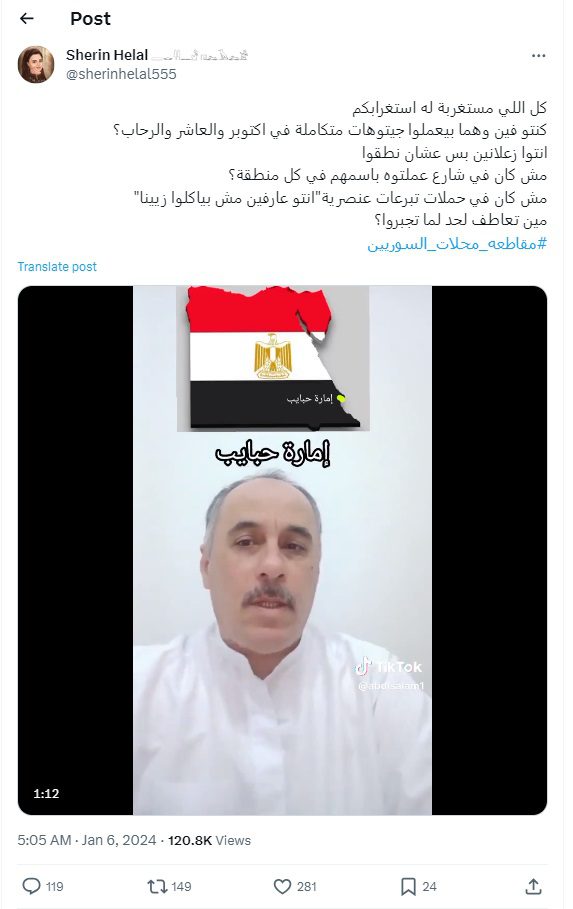
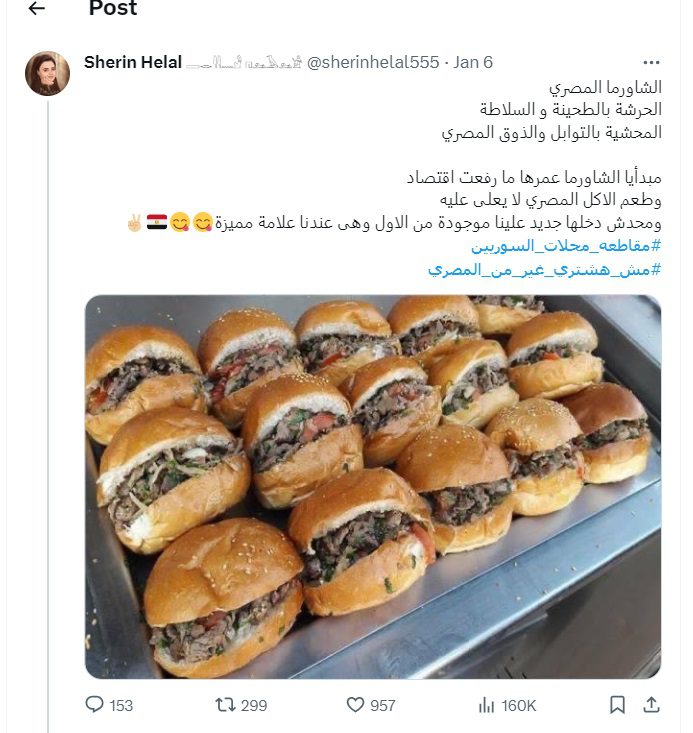
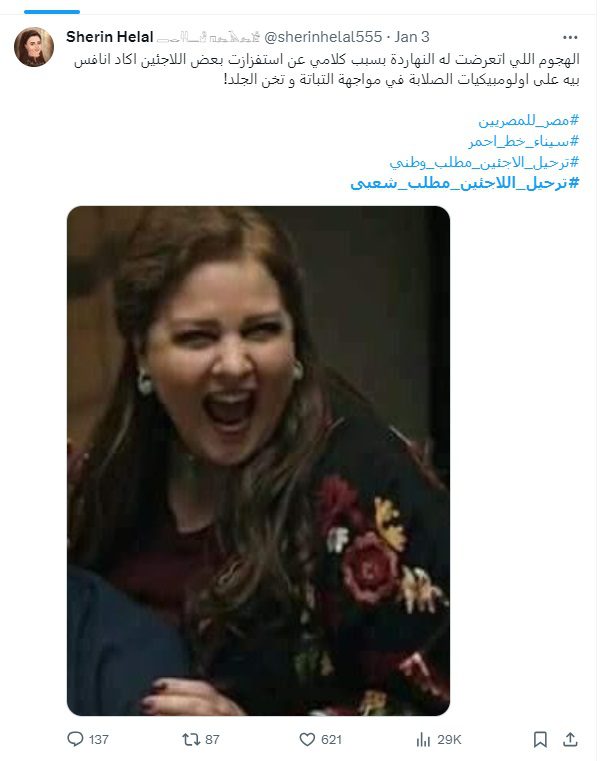
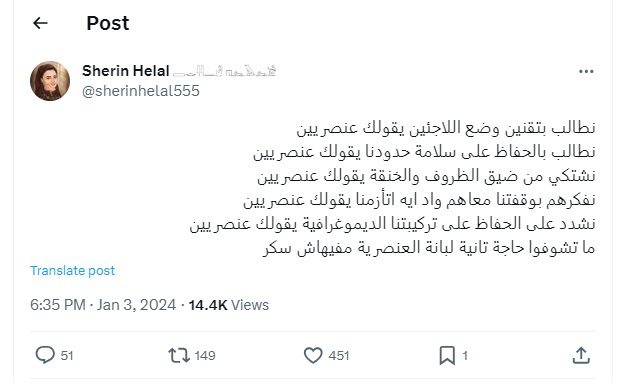
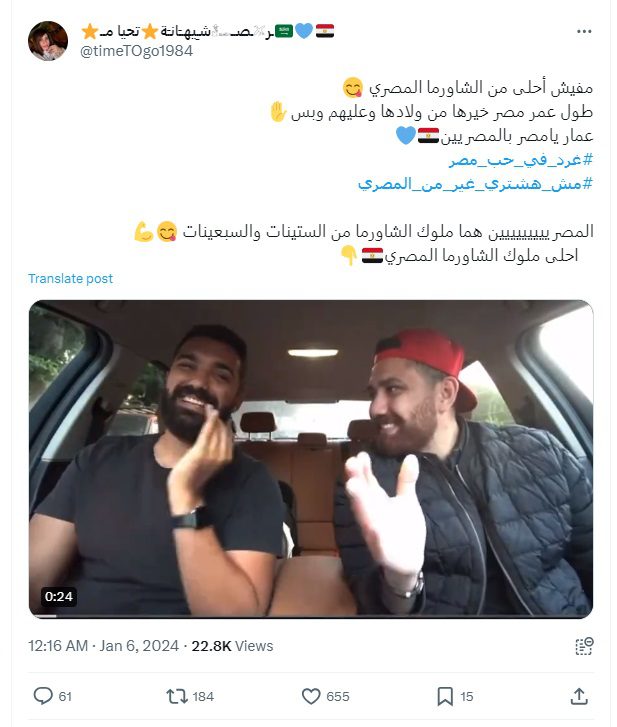
The name Bassem Bakheet frequently appears on the hashtag #I_wont_buy_except_from_Egyptians, which gathered 21,000 tweets and topped the list of the most discussed topics in Egypt on Twitter. Bakheet, also known as The Maestro, is the owner of a plastic factory in the suburb of Ain Shams in eastern Cairo. He is one of the prominent figures behind advertising campaigns supporting the government's policies and the president, as well as engaging in online trolling and harassment of opposition figures, activists, and journalists.
Bakheet operates in a network of accounts that adopt the same pattern, calling themselves Statists. These accounts, along with fake accounts, contribute to amplifying and spreading campaigns. In previous reports, we extensively discussed the nature of Bassem's role. We also observed similar activity from nationalist pages such as "Qawmi, Republic of Refugees, National Awakening, Egyptian Nationalism," some of which rallied for participation in trending hashtags. "National Pages Alliance '' brings together over 10 pages with a focus on attacking refugees.
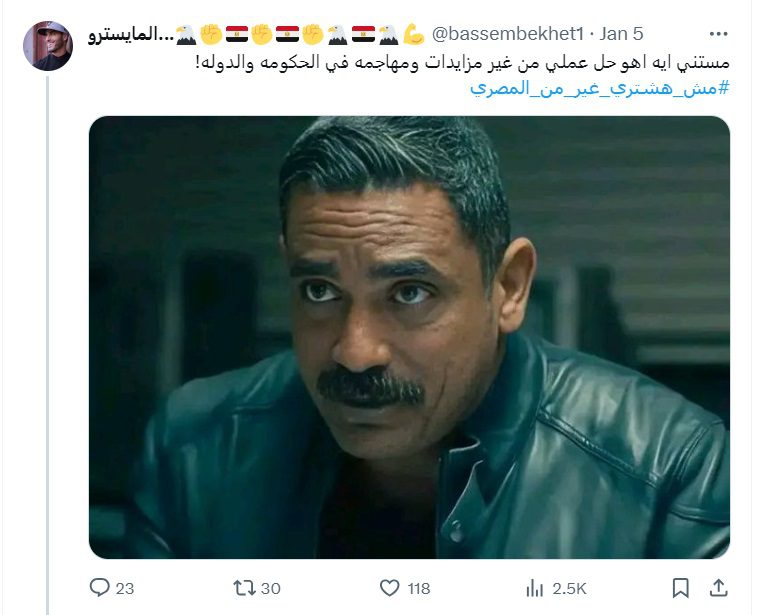

Continuous Incitement
According to the International Organization for Migration, the current number of migrants in Egypt has reached 9 million, belonging to 133 countries. The largest groups include Sudanese migrants (4 million), Syrians (1.5 million), Yemenis (1 million), and Libyans (1 million). These four nationalities make up 80% of the current resident migrants in the country. While the world observed International Migrants Day on December 18, anti-refugee hashtags were at their peak across social media platforms.
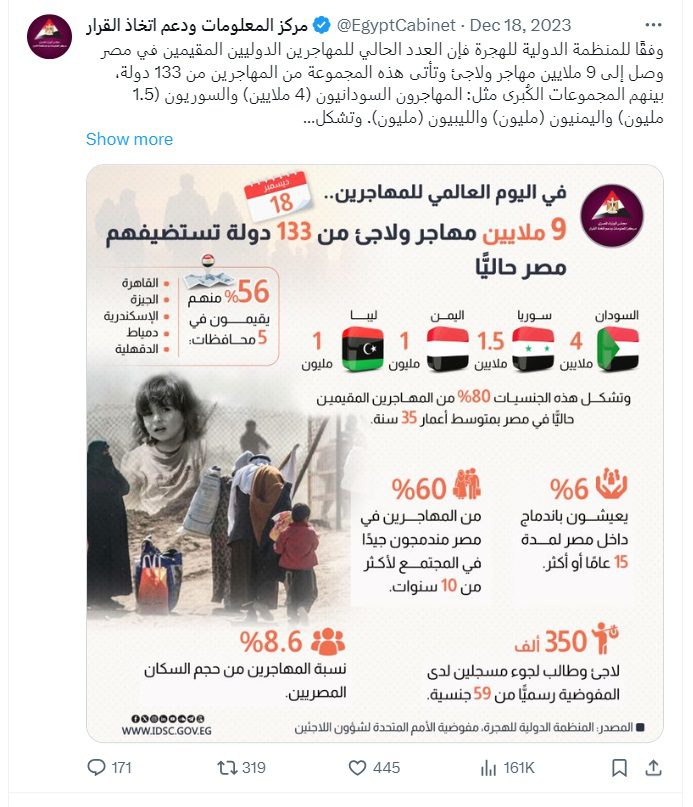
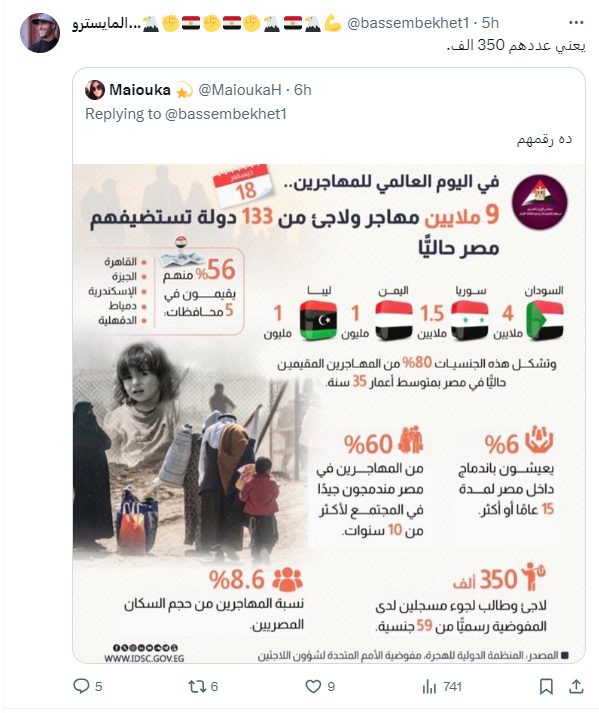
The content of the hashtags reflects a prevailing hostile tone that incites against refugees in Egypt. This includes promoting descriptions and selectively sharing video clips of incidents associated with specific nationalities, aiming to demonize and spread negative impressions about the targeted groups. The hashtags contained derogatory terms such as "Heksaus, refugees are a danger, they must be deported immediately, disgust, filth, human garbage, useless refugees." Additionally, there were calls for them to leave Egypt and return to their home countries.
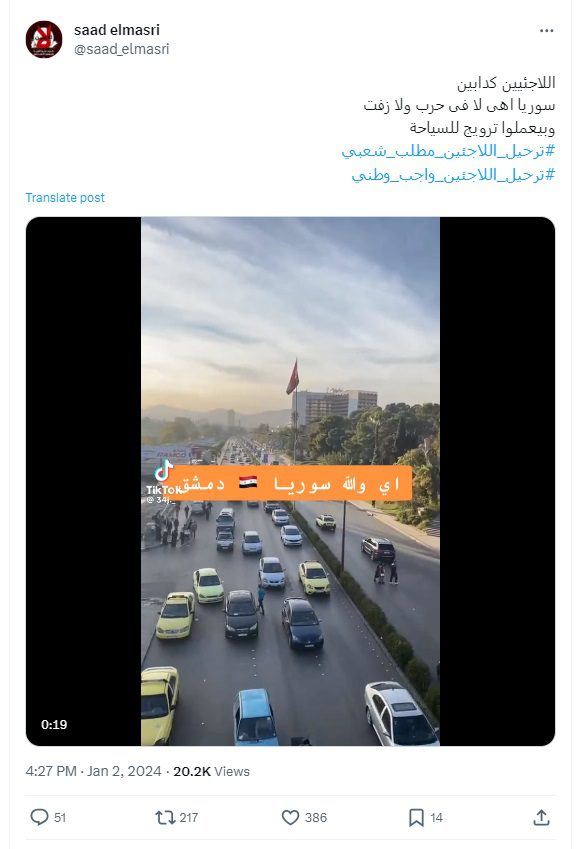
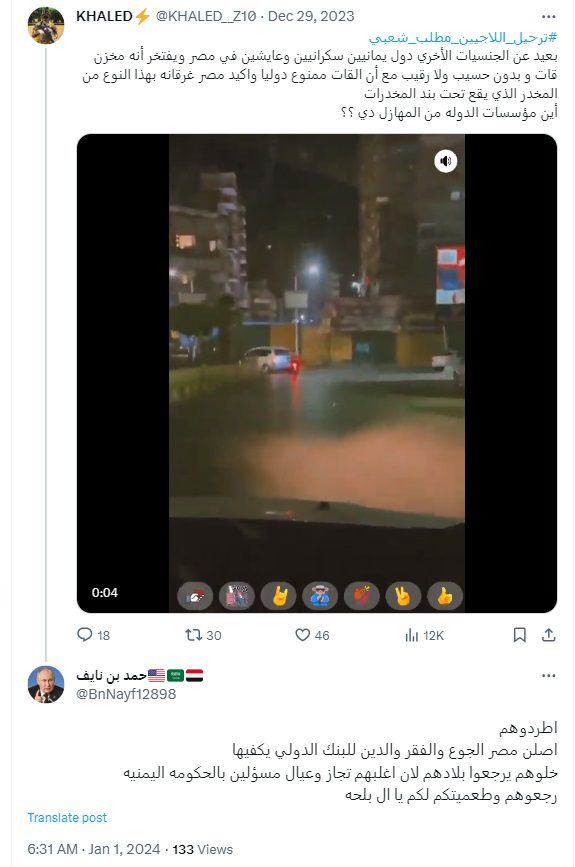
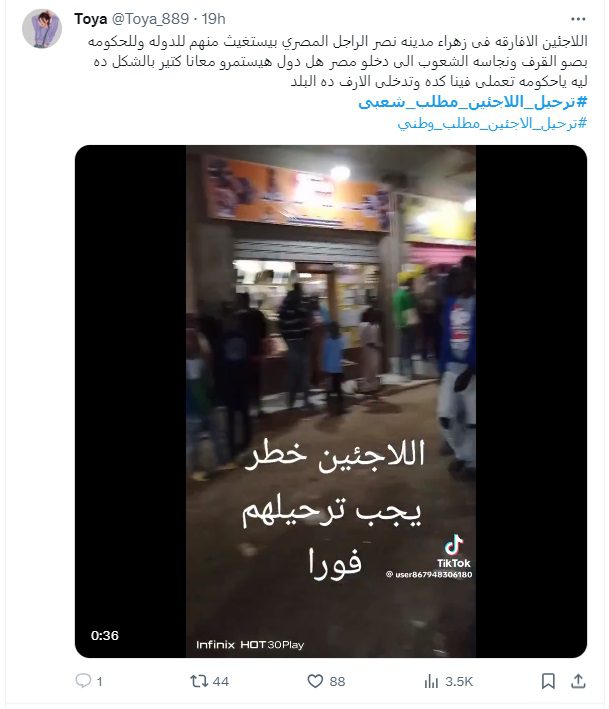
Participants in the hashtags used old videos and media coverage from local outlets to highlight more negative incidents involving some refugees and foreign residents in Egypt. The focus was on accusations of drug trafficking or violations in restaurants bearing Syrian names.
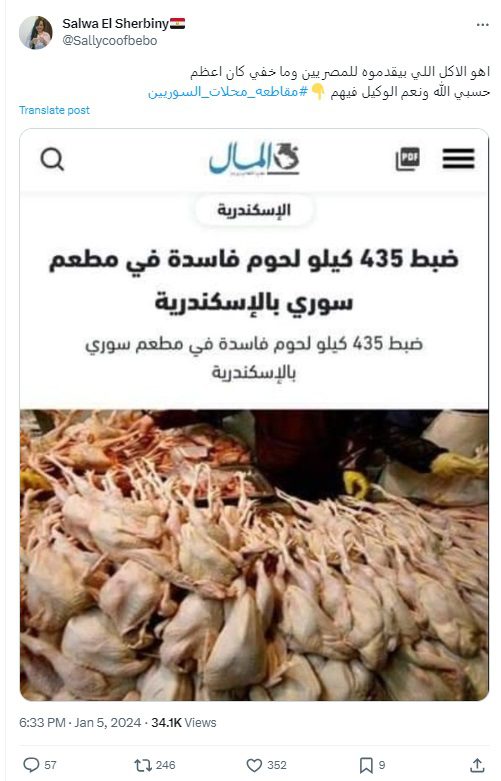
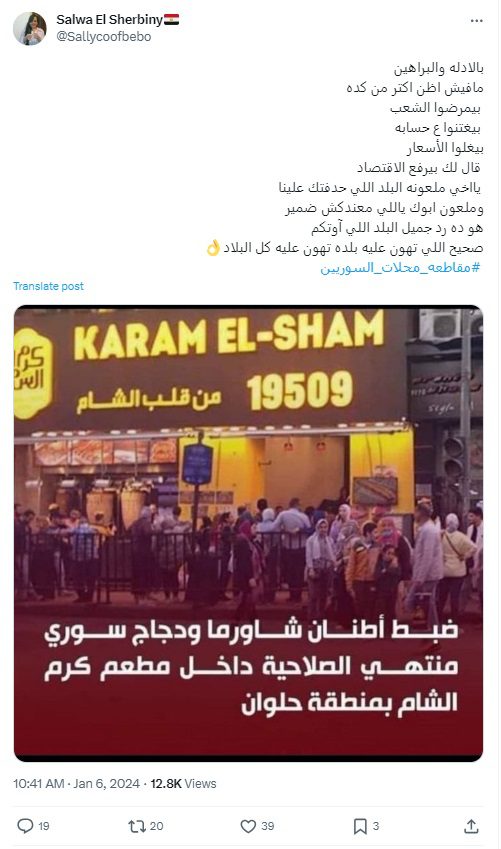
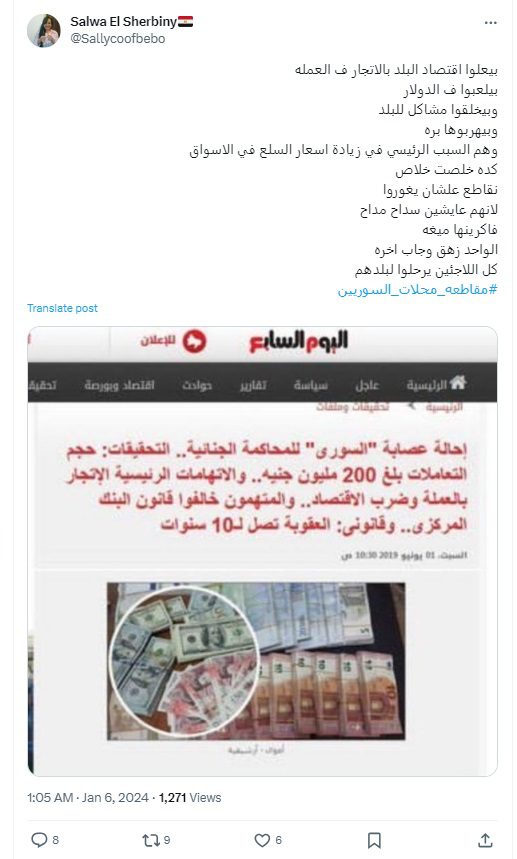
Some called for creating lists of names of shops, restaurants, and cafes owned by refugees "to help each other in boycotting, just like what they did in boycotting and destroying Egyptian homes... Unite, people of Egypt, boycott the strangers," as stated by the account @redcherry4040, which played a significant role in mobilizing and promoting various anti-refugee hashtags. Sherin, who participated in campaigns led by Al-Maestro, was also involved in these efforts.
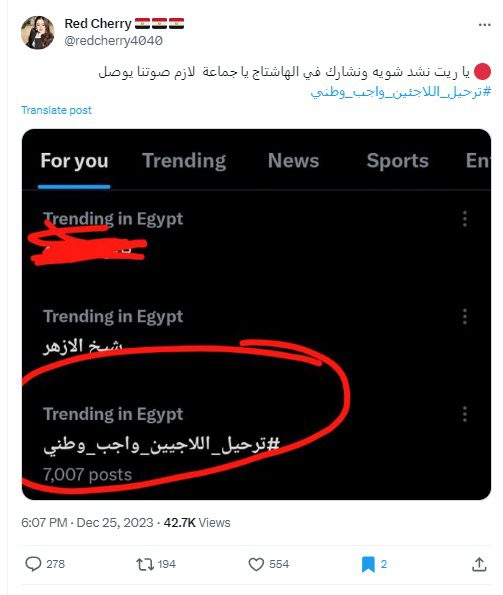
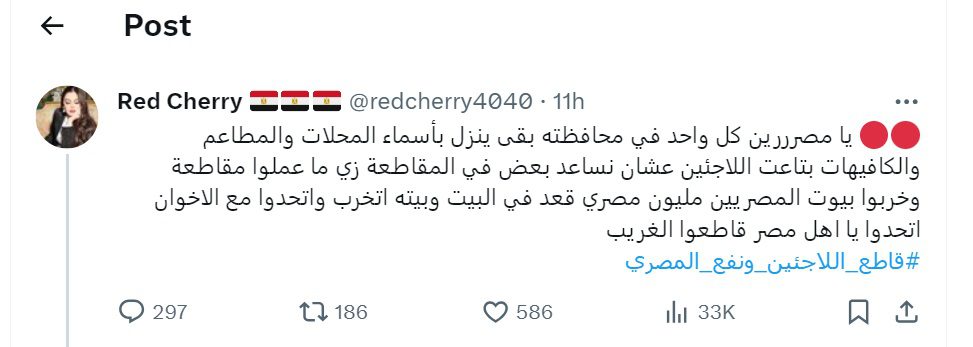
Why is this campaign concerning?
Before the Tunisian authorities expelled refugees and African migrants towards the borders with Libya in mid-2023, there was a campaign initiated by the newly emerging Tunisian National Party against African migrants in late 2022. This campaign sparked considerable controversy within society at that time. Eventually, the government took similar actions, with the approval of President Qais Saied, who stated that migrants were part of a conspiracy aimed at changing the demographic composition of the country. He accused them of being behind "violence, crimes, and unacceptable practices."
The campaign in Egypt echoes this sentiment. It blames migrants for the economic downturn and accuses them of posing a threat to public security, as well as taking jobs away from the local population.
Over the years, Egypt has remained a preferred destination for Arabs, whether visitors or those seeking refuge from wars or turmoil in their countries. Arabs generally receive good treatment from ordinary Egyptians due to a long legacy of social and historical ties, coupled with employment and educational opportunities, despite some limited complaints about harassment.
In recent years, anti-refugee campaigns have gained prominence in virtual spaces, resembling closed "echo chambers," assisted by virtual nationalist groups becoming more organized in launching defamation and trolling campaigns.
So far, these campaigns have had no tangible impact on the ground, except for garnering more emotional reactions from supporters or critics. However, media personality Amr Adib, in his program "Al Hekaya" broadcasted on "MBC Egypt," expressed concerns about the campaign against refugees and calls to boycott businesses owned by Syrians. He attributed this to what he described as an "economic war."
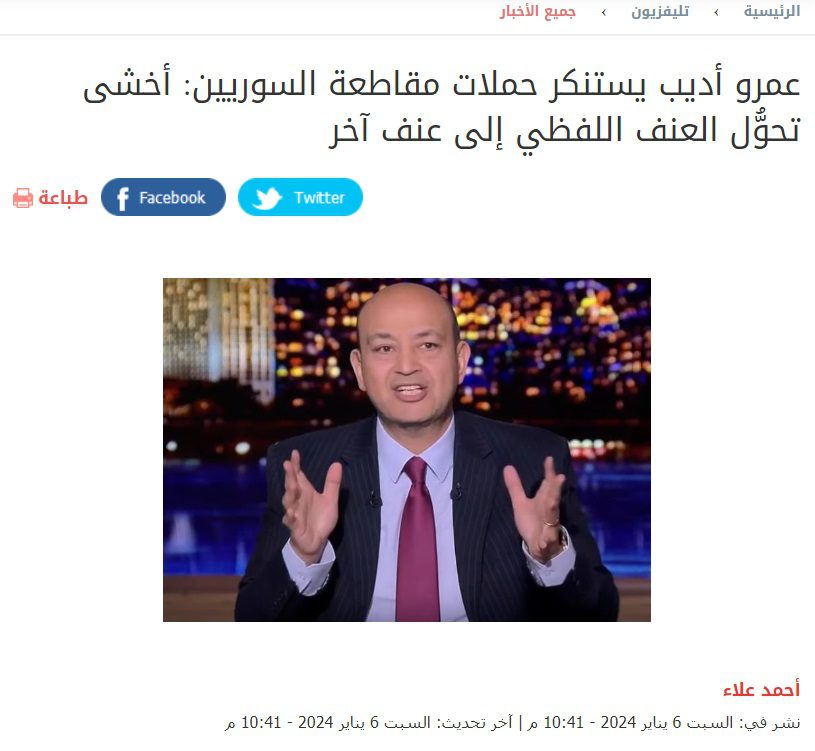
At a time when Egyptian and Arab media shed light on the wave of anti-refugee hashtags in Egypt, local sites such as "Masr Times" described it as an "anger revolution," emphasizing the demands for their deportation and accusing them of "dealing in dollars." Television programs discussed the refugee issue, with some even calling for mechanisms to urge refugees to "reduce childbirth, just as we tell Egyptians to reduce childbirth," as stated by the broadcaster Qaswa Al-Khallali on the program "In the Evening with Qaswa" on CBC satellite channel.
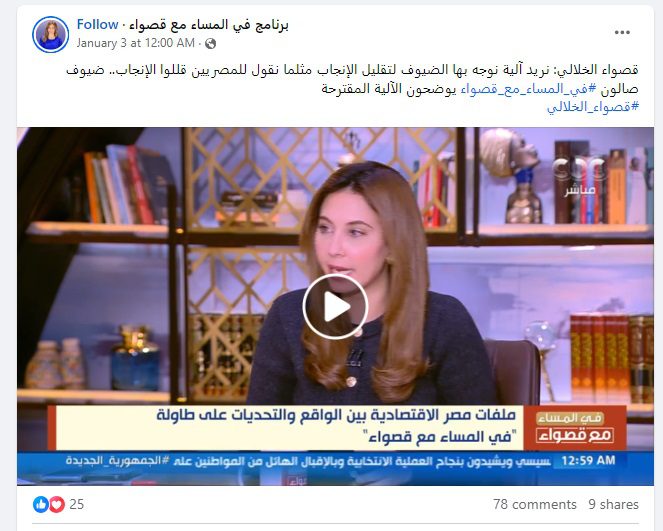
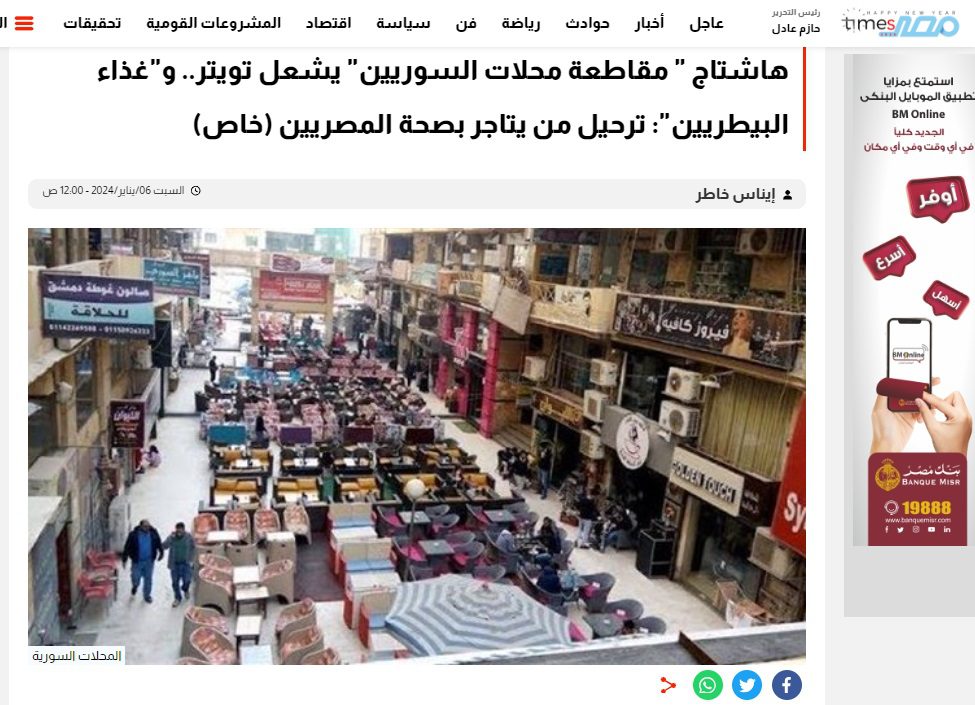
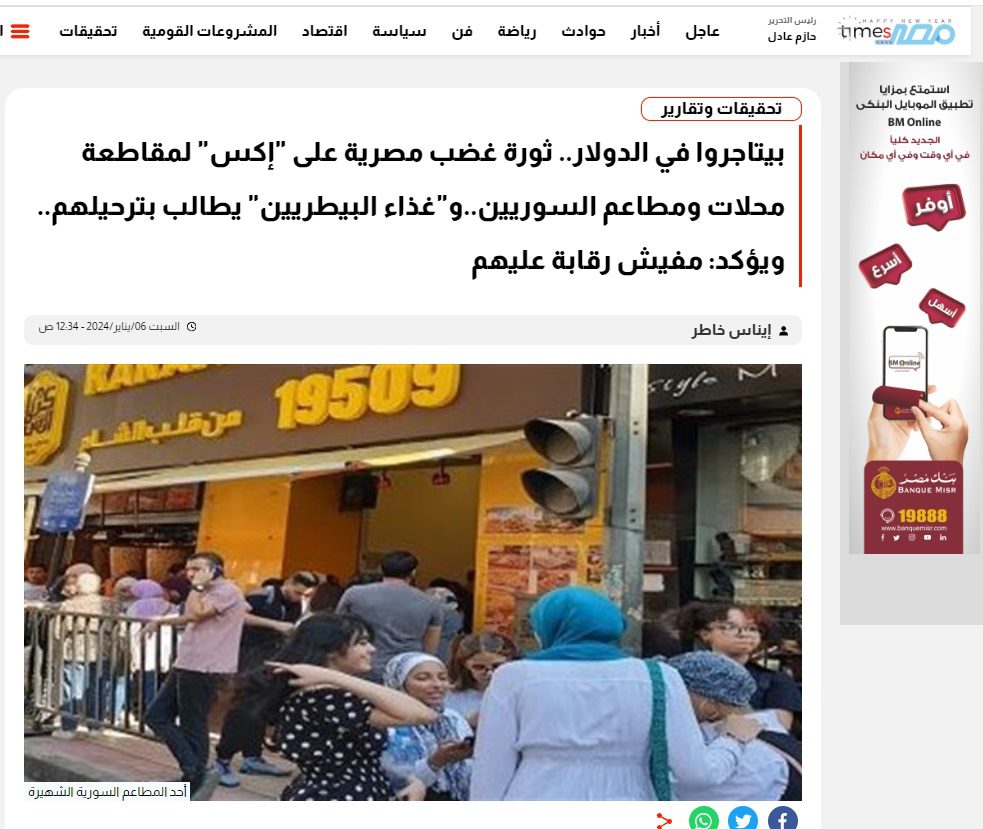
Official position: decisions and statements regarding ‘guests’
"No illegal migration boat has departed since September 2016." These are the words of the Egyptian president, referring to the tragic incident of the Rosetta boat sinking 12 kilometers off the coast of Rosetta City in the Mediterranean Sea. The boat carried hundreds of illegal migrants from Egypt, Sudan, Syria, Somalia, and Eritrea.
While migration along the Egyptian coasts has decreased, it has not stopped across the border with Libya. In October 2022, the European Union signed an agreement with Egypt worth 80 million euros, as part of the first phase of the Border Management Program, to assist the border guards and coast guards in Egypt in curbing illegal migration. This included funding for the purchase of surveillance equipment, including search and rescue ships and thermal cameras.
In 2023, the Egyptian government issued a series of decisions to regulate the status of foreigners illegally residing in the country in exchange for paying "administrative expenses" equivalent to $1,000. Some attributed these decisions to the country's need for foreign currency, but they might also indicate a new approach to the refugee issue.
Egyptian Prime Minister Mustafa Madbouly issued the first decision on this matter on August 31 last year, with a three-month deadline for payment. In November, a new decision was issued extending the deadline by an additional three months. The following month, a third decision was issued with the same text as the first one. As for the Egyptian president, the refugee issue has occupied a marginal space in his statements in recent years, using the term "guests" at least 10 times, with last year being one of the years in which Abdel Fattah el-Sisi spoke the most about the issue.
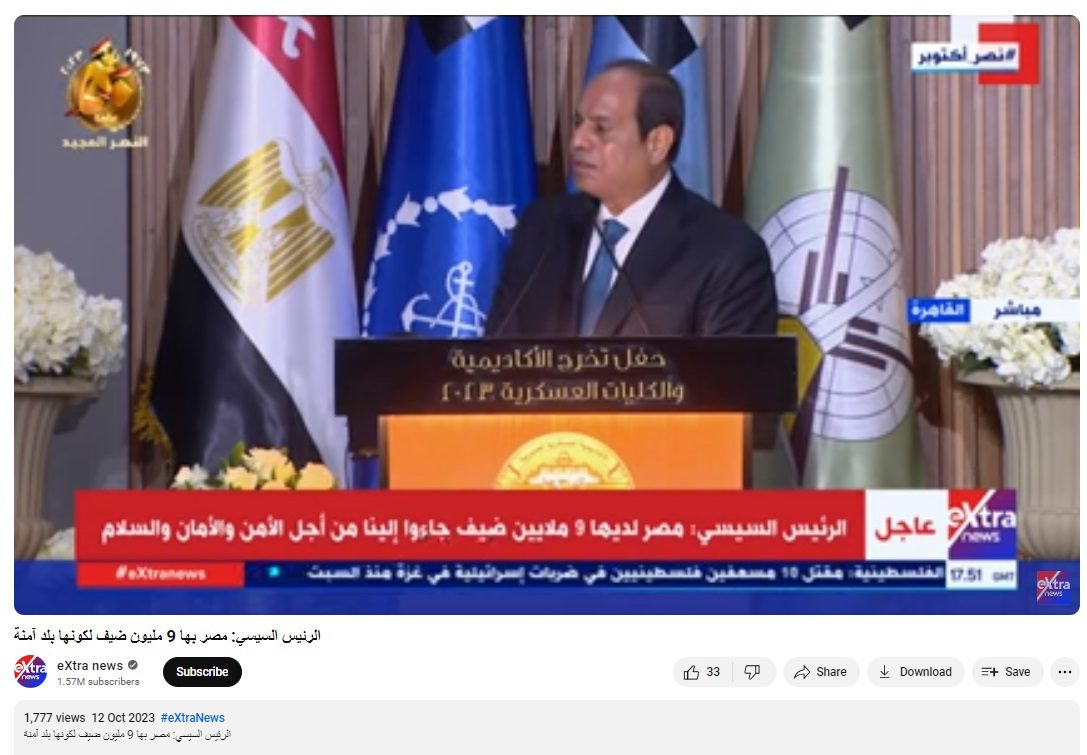
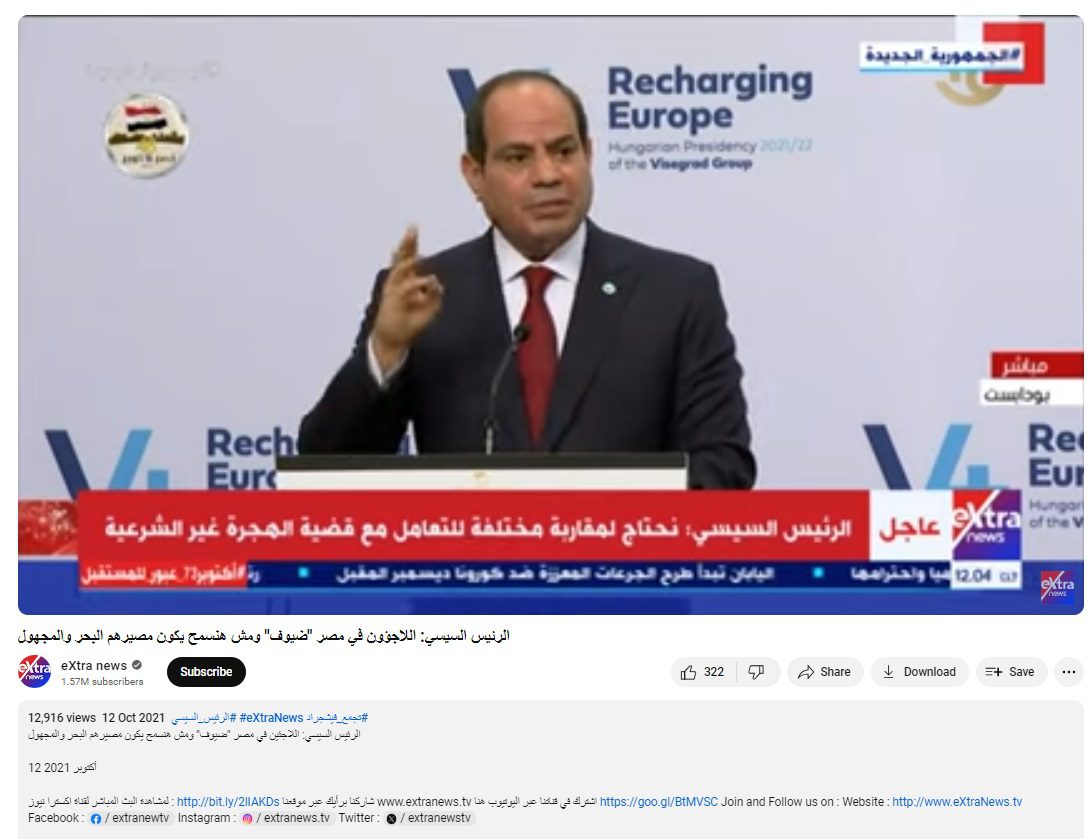
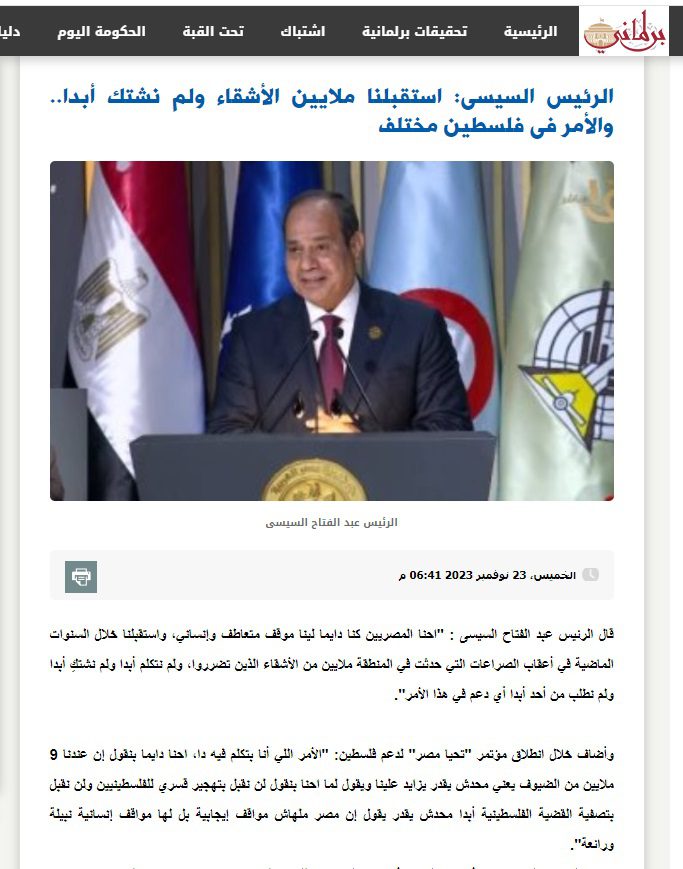
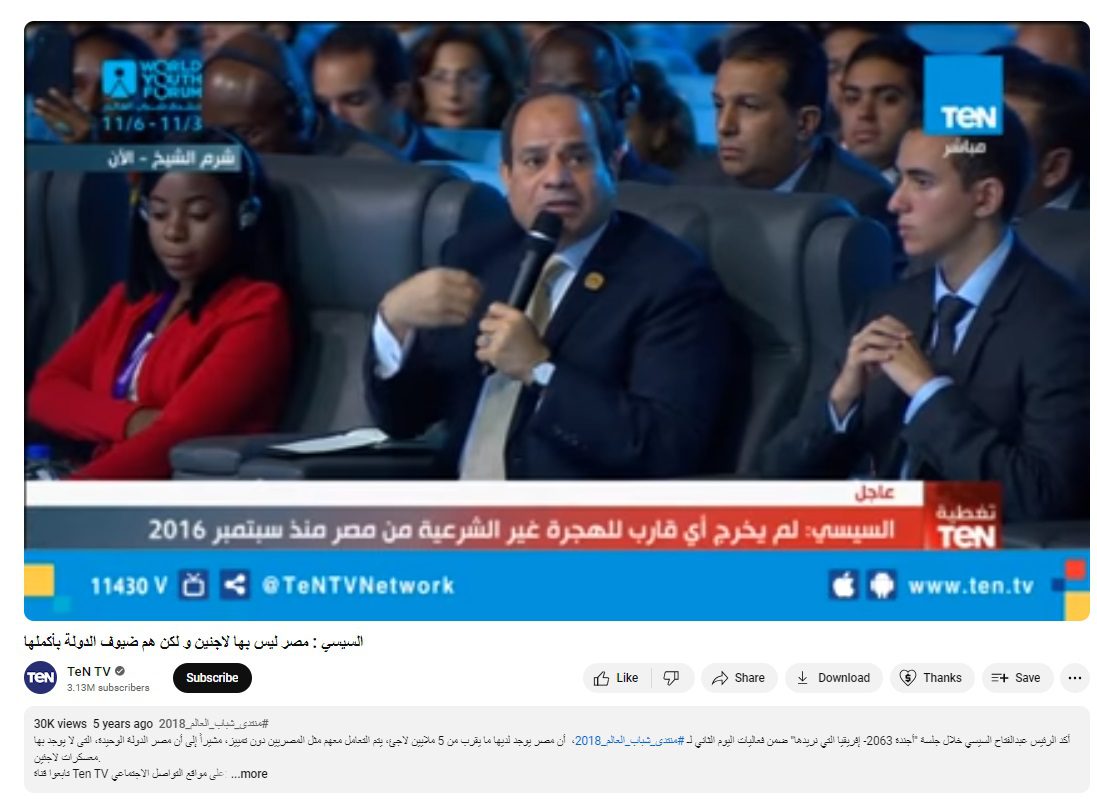
Chronologically, Sisi first used the term "guests" in November 2018, in the context of the World Youth Forum. At that time, Sisi stated that "Egypt does not have refugees, but they are guests of the entire state," indicating that Egypt has about 5 million refugees.
In February 2019, Sisi again referred to them as "guests" in the Munich Security Conference. During the World Youth Forum in December 2019, Sisi stated, "We do not label the displaced in Egypt as refugees, but they are guests with their own work and occupations, living among us and not in camps, and we do not allow any negative treatment towards them."
In September 2020, addressing the United Nations General Assembly, the Egyptian president mentioned that his country "hosts 6 million refugees and cares for them without aid or support." At the Visegrad Summit in October 2021, he stated that "refugees in Egypt are 'guests,' and we will not allow their fate to be the sea and the unknown."
"The foreigners in Egypt are not refugees but guests on its land," Sisi reiterated in January 2022 at the World Youth Forum, and in 2023, the Egyptian president used the term four times throughout the year. The first instance was during a tour of the Military College in January, when Sisi estimated the presence of "6-7 million living with us." During an inspection tour of the Military Academy in June, the president said, "We have 9 million guests present on the land of Egypt," and the same statistics were repeated during the graduation ceremony of the military academies in October.
During the Tahya Misr conference to support Palestine in November, Sisi said, "What I am talking about here, we always say that we have 9 million guests, meaning no one can exaggerate and say when we say we will not accept forced displacement of Palestinians, and we will never accept the liquidation of the Palestinian issue, no one can say that Egypt does not have positive stances but has noble and wonderful humanitarian stances."
